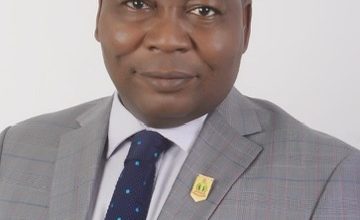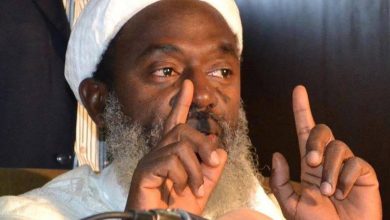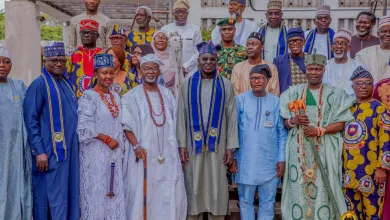Security Flash Points, As Security Agencies Threaten To Give Trouble Makers Bloody Nose
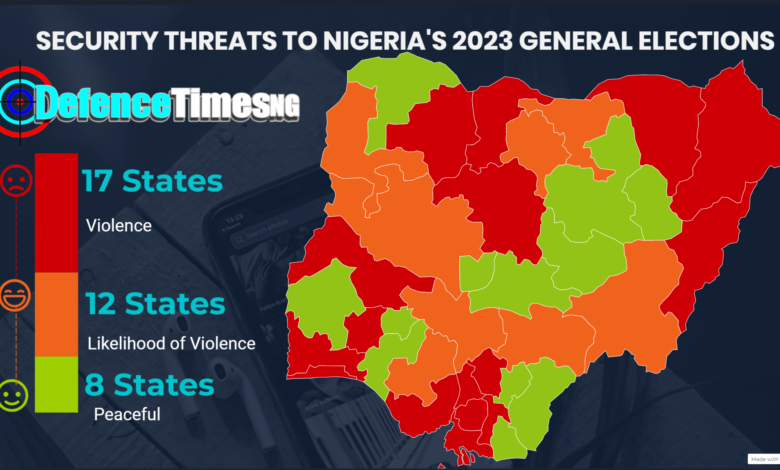
It’s barely 48hrs to Nigeria’s 2023 General Elections as all presidential candidates of the 18 political parties approved by the Independent National Electoral Commission (INEC) signed a pact towards a peaceful election come 25 February 2023. All the candidates converged on the International Conference Centre, Abuja for the landmark occasion to sign the Peace Accord for the peaceful conduct of the elections. Among the presidential candidates present at the occasion were Bola Tinubu (APC); Mr Peter Obi (LP), Atiku Abubakar (PDP), Rabiu Kwankwaso (NNPP), and Dan Nwanyanwu (ZLP).
Nigerians generally are looking forward to a free, fair and credible elections devoid of violence and all forms of election malpractices. In this vein also a lot is expected from the Nigerian Police Force being the lead agency for ensuring a good security posture during and after the elections. Moreso, is applicable to the Nigerian Armed Forces who are expected to be on standby in aid to civil authority especially in a country like Nigeria that is being ravaged by the activities of Boko Haram and ISWAP in the North Eastern part, Kidnapping and banditry in the North West, growing separative movement of Indigenous People of Biafra (IPOB) in the South East and of recent the crisis of Naira swap.
In view of the aforementioned, it became imperative for a data-driven analysis aimed at identifying possible security threat actors and flash points in Nigeria as this is expected to offer actionable intelligence to the Nigerian security agencies for troop deployment and logistics.
On the 20th of February, the Islamic State of West Africa Province (ISWAP) released a video warning Muslims to reject the upcoming democratic process in Nigeria same time highlighting attacks waged by its fighters in Borno State. In what DefenceTimeNG believed to be a valid psychological warfare to trigger its sleeper cells for attacks, the clip featured images of President Muhammadu Buhari standing with U.S. President Joe Biden, and ballot boxes in flames, the speakers argue that democracy is anathema in Islam and that by participating in the process, Muslims remove themselves from the fold of the religion. The narrator reiterated his point, stating that “elections are a great sedition, and many people fall into it, unaware of its danger, especially with the media furor over them raised by the media of the tyrants in the name of democracy”. Here, the ISWAP portrays itself as the polar opposite of Nigerian scholars and elected officials, where they abide by the dictates of their faith, including the waging of jihad and torment of “disbelief” and its adherents. No doubt there’s a high probability for ISWAP and Boko Haram to further launch attacks on military formations and Polling Units in the North East in a quest to prove their point of waging jihad and tormenting “unbelievers”.
🚨 Just four days ahead of the Nigerian general elections, the Islamic State released a 15-minute, 15-second video #Propaganda from its West Africa Province #ISWAP warning Muslims to reject the democratic process in Nigeria. Cc @Gidi_Traffic pic.twitter.com/hzFAuDlwhV
— DefenceTimesNG (@DefencetimesNG) February 21, 2023
Similarly in this vein is the worrisome activities of separatist movements in the South East who are presently agitating for the actualization of Biafra and the release of their leader Mazi Nnamdi Kanu who has been in the custody of the Nigeria state security service. His continued detention lead Simeon Ekpa, a self-acclaim human rights activist based in Finland to employ the use of social media to spread inciteful statements with political and divisive rhetoric such as “No Biafra No Election” No Nnamdi Kanu No Election. In one of his recent daily broadcasts, he instituted a Sit-At-Home Oder in the entire southeast. Orders enforced by his IPOB factions, unknown gunmen and ‘’ungun known men’’ run amok and seem to be bent on disrupting elections in the southeast. Mr Cajethan Duke claimed in a statement, that no fewer than 50 members of his party had been killed in the state. A witness, Isa Adamu, said no fewer than eight people were killed by gunmen in Umunna town near Okigwe, including some mechanics who had gone to repair a vehicle in the town.
This year 2023 is the Biafra liberation & Exit year from Nigeria. There is no amount of carnage by the Nigeria terrorist state that will stop Biafra from Exiting Nigeria this Year. Save those dates & wait for further instructions. Welcome to 2023! Wotowoto pro max with speed. pic.twitter.com/eA9hFi1mRY
— Simon Ekpa (@simon_ekpa) January 2, 2023
Against this backdrop, the National Security Adviser, Mohammed Babagana Monguno CFR stated that “It is instructive to state that the government is very much aware of plots by domestic subversive elements and their external collaborators to use the current socio-economic climate in the country due to well-intended government policies to ignite civil unrest during the election. “To this end, in line with Mr. President’s commitment to ensure a peaceful transition of political power to a democratically elected government through free, fair and credible elections, security agents have been charged to ensure lawful deployment to deal decisively with any individual or group involved, no matter how highly placed,” This is no doubt aimed at consolidating on the successes of the Armed Forces against insecurity trend in the country. To match actions with words, there has been massive deployment of security personnel nationwide which is always marked by troops’ display of show of force in their area of responsibility.
The Nigerian Army/ other security agencies in Borno have commenced five days “Show of Force”in readiness to provide required security during / after the Feb. 25 Presidential election in state, Brig.Gen. Jafar Ibrahim, the Commander 7 Division Garrison, Operation Hadin Kai, said. pic.twitter.com/gZmh9zPUeh
— Zagazola (@ZagazOlaMakama) February 20, 2023
In line with President Muhammadu Buhari directives, most security agencies including the Economic and Financial Crimes Commission (EFCC) have also released hotlines for response in case of any security bridged and suspected vote Buying during the elections.
MESSAGE ON ELECTION SECURITY
Members of the general public can now call/sms Nigerian Army hotlines for the 36 States and FCT to report any security breach during the 2023 General Elections nationwide. Swift response is guaranteed. Pls RT Aggressively #NigeriaDecides2023 pic.twitter.com/mJUGR5Bf7K
— UNCLE DEJI™️ (@DejiAdesogan) February 21, 2023
Consequently, as a result of our data-driven security analysis, it was identified that out of 37 states including the FCT, 17 states are prone to witness violent elections with 12 states having the likelihood of violent elections while only 8 states would witness peaceful conduct of elections. furthermore, the report identified 85 LGAs and 578 communities with High-security risks.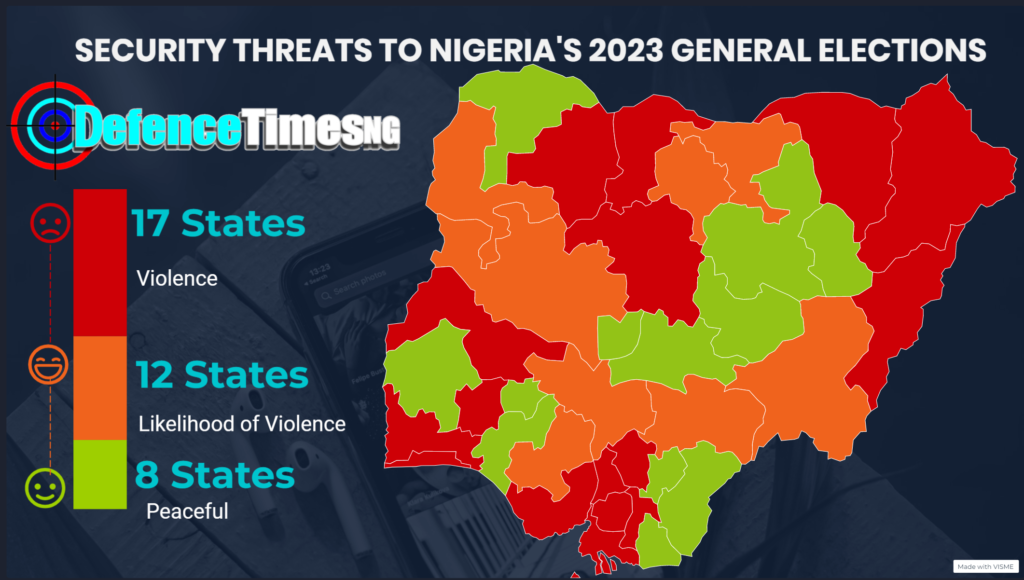
Moreso is the fallout of the recently enacted Electoral Act of 2022, which ushered in the era of INEC digitization. The introduction of the Bimodal Voter Accreditation System (BVAS) and INEC Result Viewing Portal (IReV) to combat ballot stuffing, ballot snatching, results collation tampering, and voter fraud though mitigated these challenges but with increased dependence on technology, comes the requisite cyber security threats to INEC processes. This was seen during the 2022 Ekiti and Osun elections as INEC their portal experienced “significant cyber-attacks that were put to rest by INEC cyber security teams. Some of the threat actors envisaged are elements of disinformation and misinformation campaigns which are designed to influence the individual voter’s decision-making process, through intentional and unintentional dissemination of false information. There are also threats associated with deep fake videos which are doctored voiceover videos. This is particularly scary in places like Nigeria where inappropriate comments about tribe and religion could lead to physical violence and destruction. Also in this list are elements of cyber attacks on Person of Interest and Political Parties of Interest website Distributed Denial of Service and Website Defacing.



